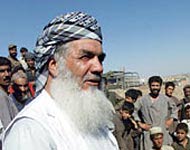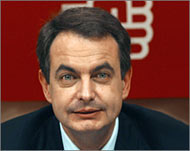Troops in Afghanistan before funeral
The Afghan government has sent more troops to the troubled western city of Herat to assert its authority before the funeral of the provincial governor’s son.

Bloody clashes followed Sunday’s assassination of Aviation Minister Mirqais Sadiq who is also the son of governor Ismail Khan.
The Defence Ministry began dispatching troops from the new national army to re-establish a presence in the city on Monday after the government commander was driven out after fighting on Sunday with powerful governor Ismail Khan’s forces.
An official said on Tuesday that the government planned to station a total of 1500 troops in Herat. The soldiers were going “to stabilise and secure the situation” and had already been well received, Deputy Defence Minister Rahim Wardak said.
“I think that they will see them as liberators from some oppressive system which is unfortunately unfolding in that province,” he told Reuters.
Determination
“It demonstrates the firm determination on the part of the central government and gives a signal to all those who are up to some sort of mischief that they better think it over,” he said.
“After this, the government will be decisive and the Afghan National Army is ready to be deployed anywhere.”
More than 100 people, including civilians, were reported to have been killed in the clashes, some of the worst violence between pro-government factions since President Hamid Karzai was installed after US-led forces ousted the Taliban in 2001.
The clashes underscore the US-backed president’s difficulties, asserting his rule over powerful regional governors such as Khan and bringing stability before elections supposed to be held in June, but widely expected to be delayed.
Government support
Dozens of soldiers, armed with assault rifles, machine guns and rocket-propelled grenades were seen boarding planes in Kabul on Tuesday morning. The Afghan Islamic Press News agency said 140 were seen disembarking in Herat.
 |
|
Ismail Khan made his name in the |
The commander, whose forces were accused of sparking Sunday’s fighting by killing Khan’s son Mirwais Sadiq, said he was in neighbouring Baghdis province.
Zahir Nayebzada said all his actions had been in support of
Karzai’s government. “I will obey the orders of the central
government,” he said.
Speaking to the Pakistan-based Afghan Islamic Press,
Nayebzada accused Khan’s men of starting the fighting and said he still had 2000 troops with him.
Funeral
Khan, an Islamic hardliner who made his name in the struggle against Soviet occupation in the 1980s, professes loyalty to Karzai’s US-backed government, but has often been accused of running a personal fiefdom in the west.
|
“I think that they will see them (the soldiers) as liberators from some oppressive system which is unfortunately unfolding in that province” Rahim Wardak, |
He has been at odds with Karzai in the past for failing to give up tens of millions of dollars in customs revenues from Herat, which controls the bulk of Afghanistan’s trade. Last year he was stripped of his post as the province’s military chief.
A funeral ceremony for Sadiq, to be attended by Khan and a
central government delegation including the powerful defence
Minster Muhammad Qasim Fahim and Interior Minister Ali Ahmad Jalali, was due to be held on Tuesday afternoon.
Khan’s spokesman, Ghulam Muhammad Masoan, said many people were expected to attend the ceremony in an ancient graveyard just outside the city.
He called the killing of Sadiq a “premeditated” act. The government has said it will decide its next step after Fahim and Jalali report back on the fighting.
Spanish troops
Also on Tuesday, Incoming Socialist
Prime Minister Jose Luis Rodriguez Zapatero said he intended to boost Spain’s military presence in Afghanistan to demonstrate his commitment to the fight against international terrorism, the left-wing daily El Pais reported.
 |
|
Jose Zapatero speaks during a |
After his surprise general election victory on 14 March, Zapatero announced that he would withdraw the 1300 Spanish troops in Iraq unless the United Nations took over from the US-led occupying force there by 30 June.
El Pais has noted the international force in Afghanistan – unlike the US-led occupation in Iraq – is established with the authority of the UN Security Council and is under NATO command.
Spain already has 125 troops in Afghanistan but El Pais did not say how many more soldiers the new government would send.